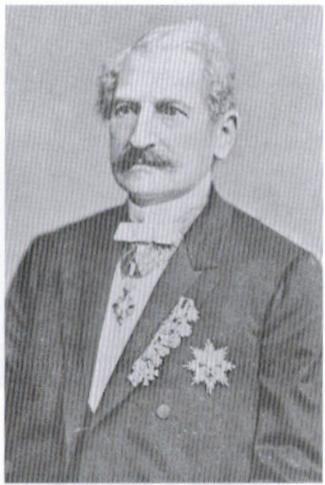Gustav Heine Von Geldern on:
[Wikipedia]
[Google]
[Amazon]
 Gustav Heine, after 1870 Gustav
Gustav Heine, after 1870 Gustav
 Gustav Heine, after 1870 Gustav
Gustav Heine, after 1870 Gustav Freiherr
(; male, abbreviated as ), (; his wife, abbreviated as , ) and (, his unmarried daughters and maiden aunts) are designations used as titles of nobility in the German-speaking areas of the Holy Roman Empire, the Austro-Hungarian Empire and in ...
Heine von Geldern also Gustav von Heine-Geldern (18 June 1812, in Düsseldorf
Düsseldorf is the capital city of North Rhine-Westphalia, the most populous state of Germany. It is the second-largest city in the state after Cologne and the List of cities in Germany with more than 100,000 inhabitants, seventh-largest city ...
– 15 November 1886, in Vienna
Vienna ( ; ; ) is the capital city, capital, List of largest cities in Austria, most populous city, and one of Federal states of Austria, nine federal states of Austria. It is Austria's primate city, with just over two million inhabitants. ...
), was a German-Austrian
Austrian may refer to:
* Austrians, someone from Austria or of Austrian descent
** Someone who is considered an Austrian citizen
* Austrian German dialect
* Something associated with the country Austria, for example:
** Austria-Hungary
** Austria ...
journalist and press publisher.
He was born into a Jewish family in Düsseldorf; one of his brothers was Heinrich Heine
Christian Johann Heinrich Heine (; ; born Harry Heine; 13 December 1797 – 17 February 1856) was an outstanding poet, writer, and literary criticism, literary critic of 19th-century German Romanticism. He is best known outside Germany for his ...
. On completing his preliminary education at Hamburg
Hamburg (, ; ), officially the Free and Hanseatic City of Hamburg,. is the List of cities in Germany by population, second-largest city in Germany after Berlin and List of cities in the European Union by population within city limits, 7th-lar ...
he studied at the universities of Halle and Göttingen
Göttingen (, ; ; ) is a college town, university city in Lower Saxony, central Germany, the Capital (political), capital of Göttingen (district), the eponymous district. The River Leine runs through it. According to the 2022 German census, t ...
. He first engaged in agriculture, then in business, and then entered the Austrian army, rising to the rank of first lieutenant
First lieutenant is a commissioned officer military rank in many armed forces; in some forces, it is an appointment.
The rank of lieutenant has different meanings in different military formations, but in most forces it is sub-divided into a se ...
. In 1847 he founded in Vienna ''Das Fremdenblatt'', a periodical
Periodical literature (singularly called a periodical publication or simply a periodical) consists of Publication, published works that appear in new releases on a regular schedule (''issues'' or ''numbers'', often numerically divided into annu ...
that became the official organ of the Austrian Foreign Office. In 1867 he was made a member of the Order of the Iron Crown
The Order of the Iron Crown () was an order of merit that was established on 5 June 1805 in the Kingdom of Italy by Napoleon Bonaparte under his title of Napoleon I, King of Italy.
The order took its name from the ancient Iron Crown of Lombard ...
3rd class and, as provided by the statutes of this order, made a hereditary knight within the Austrian Nobility. In 1870 he was elevated to the rank of Freiherr
(; male, abbreviated as ), (; his wife, abbreviated as , ) and (, his unmarried daughters and maiden aunts) are designations used as titles of nobility in the German-speaking areas of the Holy Roman Empire, the Austro-Hungarian Empire and in ...
, with the cognomen
A ''cognomen'' (; : ''cognomina''; from ''co-'' "together with" and ''(g)nomen'' "name") was the third name of a citizen of ancient Rome, under Roman naming conventions. Initially, it was a nickname, but lost that purpose when it became hereditar ...
Geldern, his mother's family name. He was also decorated with the Order of Franz Joseph
The Imperial Austrian Order of Franz Joseph () was founded by Emperor Franz Joseph I of Austria on 2 December 1849, on the first anniversary of his accession to the imperial throne.
Classes
The order was originally awarded in three classes: ''G ...
of the second class.
Marriage and family
He was married to Emilie Kaan von Albest (1824–1859) with whom he had five children. After his wife's death he was briefly engaged to Countess Bertha Kinsky von Wchinitz und Tettau, who later became first woman to be awarded theNobel Peace Prize
The Nobel Peace Prize (Swedish language, Swedish and ) is one of the five Nobel Prizes established by the Will and testament, will of Sweden, Swedish industrialist, inventor, and armaments manufacturer Alfred Nobel, along with the prizes in Nobe ...
, but she broke off an engagement before the marriage occurred.
One of his sons, Maximilian (Max) Freiherr von Heine-Geldern (1849–1929), wrote under the name "Heldern", and was the author of the libretto to the operetta ''Mirolan''. Through his daughter Maria von Heine-Geldern (1848–1911) he was maternal grandfather of Count Gustav Heinrich Maria Sizzo de Noris.
References
* 1812 births 1886 deaths Austrian Ashkenazi Jews Austrian soldiers Austrian barons German barons 19th-century German Jews People from Düsseldorf Heinrich Heine {{Europe-noble-stub